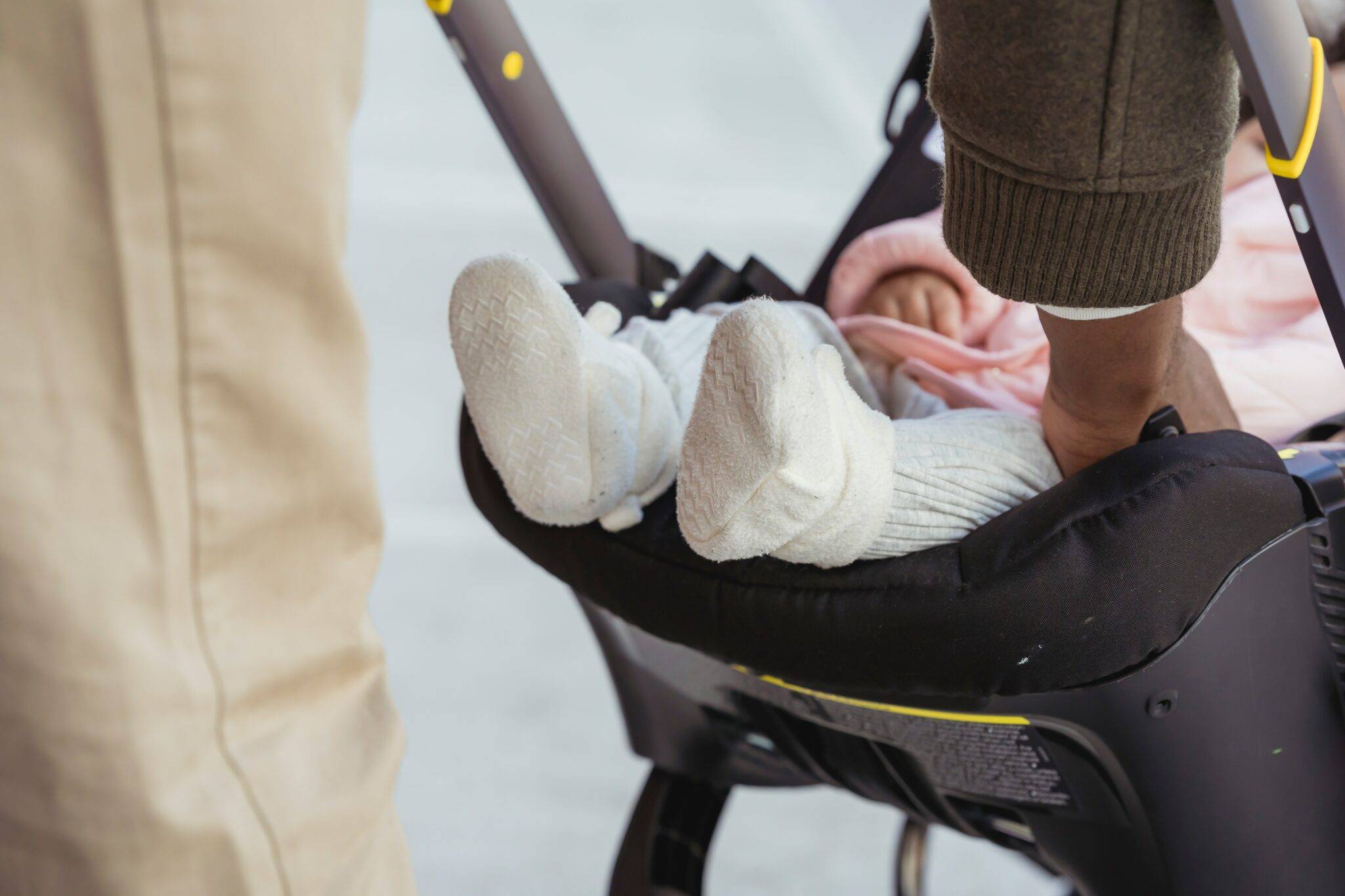Welcoming a newborn into the family is one of life’s greatest joys, but it also brings a host of challenges, particularly your baby’s health. One common issue that causes significant concern for new parents is when your newborn baby is constipated.
When your newborn seems uncomfortable and is struggling with bowel movements, it’s natural to feel anxious. However, there are many effective ways to help alleviate this issue. This comprehensive guide will discuss how to recognize constipation in newborns and explore remedies to help your baby feel better as quickly as possible.
Understanding When Newborn Baby is Constipated
What Exactly Is Newborn Constipation?
Newborn constipation is when your baby experiences difficulty passing stool, which may result in infrequent, hard, or dry bowel movements. Unlike older children or adults, newborns can have highly variable bowel movement patterns. Some newborns may pass stool several times a day, while others might go without a bowel movement. As a parent, know what’s normal for your baby so you can recognize when your newborn baby is constipated.
How Often Should a Newborn Poop?
Before jumping to conclusions, it’s important to understand what constitutes a normal bowel movement pattern for your baby. The frequency of bowel movements depends on several factors, including whether they are breastfed or formula-fed. Newborns, especially in their first month, often pass stool frequently—sometimes after every feeding. This is particularly true for breastfed babies. As they grow, the frequency decreases, and it is not uncommon for a breastfed baby to go for a few days without bowel movements.
Formula-fed babies tend to have fewer bowel movements. A formula-fed newborn will have one or two bowel movements a day. However, some formula-fed infants may also go without passing stool. It’s essential to be aware of these normal patterns to distinguish between what is usual for your baby and what might indicate constipation. However, if your baby hasn’t pooped in more than three days and seems uncomfortable, they might be constipated. Every baby is different, so it’s important to track your baby’s patterns and consult a pediatrician if unsure.
Recognizing the Signs When Newborn Baby is Constipated
Recognizing when a newborn baby is constipated is key to providing timely relief. While bowel movement patterns vary, here are some common signs to watch for:
- Infrequent Bowel Movements: A noticeable decrease in the frequency of bowel movements, particularly if they haven’t pooped in over three days.
If your baby goes longer than usual between bowel movements, it might be constipation. For example, if your newborn typically has bowel movements every day and suddenly goes two or three days without one, this could indicate constipation.
- Hard or Pellet-Like Stools: When your baby does pass stool, it may be hard, dry, or resemble small pebbles—an indicator of constipation.
- Straining or Difficulty Passing Stool: While some grunting is normal for babies, excessive straining, along with crying or discomfort, can be a sign of constipation.
- Crying During Bowel Movements: If your baby seems to be in pain or cries while trying to pass stool, they might be constipated.
- Firm or Bloated Belly: If your baby’s abdomen feels hard or looks swollen, it could be due to gas or constipation.
Top Remedies for Newborn Constipation
Now that you know how to identify constipation in your newborn, it’s time to explore remedies. These methods are safe, gentle, and designed specifically with the delicate nature of a newborn’s digestive system in mind.
1. Dietary Adjustments for Mom and Baby
Diet plays a significant role in a baby’s digestive health, whether breastfed or formula-fed. Understanding how different foods and formulas affect your baby can help you make the right choices to alleviate constipation.
For Breastfed Babies: Mom’s Diet Matters
Breast milk is generally easier for babies to digest than formula, and it’s less likely to cause constipation. However, there are still instances where dietary adjustments can make a difference.
- Increase Fiber in Your Diet: As a breastfeeding mother, what you eat can influence your baby’s digestion. Increasing your intake of fiber-rich foods like leafy greens, fruits, whole grains, and legumes can help. Fiber helps soften stools by increasing water content, making it easier for your baby to pass stools.
- Stay Hydrated: Proper hydration is crucial, not just for your health, but also for maintaining the quality of your breast milk. Dehydration can lead to more concentrated milk, which may contribute to constipation. Make sure you’re drinking plenty of water throughout the day.
For Formula-Fed Babies: Choosing the Right Formula
Formula-fed babies are more prone to constipation because formula is typically harder to digest than breast milk. If you suspect that the formula is causing constipation, here are some adjustments you can consider:
- Switch to a Different Formula: Some formulas, especially those high in iron or certain proteins, can cause constipation. Consult with your pediatrician about switching to a different formula that’s easier on your baby’s digestive system. Some brands offer formulas specifically designed for babies with sensitive stomachs or those prone to constipation.
- Add Extra Water: With your pediatrician’s approval, you might consider adding a small amount of extra water to your baby’s formula. This can help keep your baby hydrated and prevent hard stools. However, this should be done cautiously and only under medical guidance to avoid diluting essential nutrients.
2. Tummy Time and Gentle Tummy Massage
Tummy time isn’t just essential for strengthening your baby’s neck and shoulder muscles; it can also be beneficial for digestion. Spending time on their tummy can help your baby relieve gas and stimulate bowel movements.
How to Perform a Gentle Tummy Massage
Massaging your baby’s tummy is a simple yet effective way to alleviate constipation. Here’s how you can do it:
- Warm Your Hands: Before starting the massage, rub your hands together to warm them up. This makes the experience more comfortable for your baby.
- Use a Gentle Circular Motion: Lay your baby on their back. Using two fingers, gently press down on their abdomen and move your hand in a circular, clockwise motion. This follows the natural path of the intestines and helps stimulate bowel movements.
- Combine With Bicycle Legs: After massaging the tummy, you can move your baby’s legs in a bicycle motion. Hold their legs and gently push one knee towards the abdomen while extending the other leg, then alternate. This exercise helps relieve gas and encourages bowel movements.
3. The Comfort of a Warm Bath
A warm bath can be soothing for a constipated baby. The heat helps relax the abdominal muscles, which can facilitate bowel movements.
Tips for a Bath That Helps With Constipation
- Set the Right Temperature: Ensure the bathwater is comfortably warm but not hot. Test the water with your wrist before placing your baby in the tub.
- Create a Calm Environment: A quiet and calm environment helps your baby relax fully, making the bath more effective. You can dim the lights or play soft music.
- Follow Up With a Massage: After the bath, gently pat your baby dry and consider giving them a tummy massage to aid digestion and stimulate bowel movements.
4. Bicycle Leg Exercises
Physical activity is important even for newborns. Simple exercises like bicycle legs can help relieve constipation by stimulating your baby’s digestive system.
How to Perform Bicycle Leg Exercises
- Position Your Baby: Lay your baby on their back on a soft, comfortable surface.
- Move the Legs in a Cycling Motion: Hold your baby’s legs and move them as if pedaling a bicycle. This motion helps to relieve gas and can stimulate the bowels, making it easier for your baby to pass stool.
- Incorporate into Daily Routine: You can perform this exercise several times, especially after feedings, to keep your baby’s digestion on track.
5. Probiotics: Supporting Gut Health
Probiotics are beneficial bacteria that help maintain a healthy balance in the digestive system. For newborns, probiotics can be particularly helpful in preventing and alleviating constipation.
Choosing and Using Probiotics for Your Baby
- Consult Your Pediatrician: Before introducing probiotics to your baby’s diet, it’s essential to consult with your pediatrician. They can recommend a suitable product that is safe for newborns.
- Probiotic Drops: Probiotics for babies often come in drops, which are easy to administer. Mix them into breast milk, formula, or give them directly by dropper. Probiotics can support your baby’s gut health and reduce the likelihood of constipation.
6. Feeding Schedule and Portion Control
How and when you feed your baby can also influence their bowel movements. Overfeeding or large feedings can sometimes overwhelm a newborn’s digestive system, leading to constipation.
Optimizing Your Baby’s Feeding Schedule
- Offer Smaller, More Frequent Feedings: If your baby is constipated, try feeding them smaller amounts more frequently. This can help their digestive system process food more effectively without becoming overwhelmed.
- Burp Your Baby Regularly: Burping helps release any trapped air that could contribute to gas and discomfort. Make sure to burp your baby during and after feedings to aid digestion.
7. Ensuring Adequate Hydration
Hydration is crucial for preventing and treating constipation in newborns. While newborns typically get all the hydration they need from breast milk or formula, there are circumstances where additional fluids might be necessary.
Hydration Tips for Newborns
- Water for Babies Over Six Months: For babies older than six months, offering a small amount of water between feedings can help prevent constipation. However, water should only be introduced after six months and in small quantities.
- Diluted Fruit Juice: For babies older than six months, offer a small amount of diluted prune or pear juice. These juices are natural laxatives and can help stimulate bowel movements. Consult with your pediatrician before introducing juice to your baby’s diet.
8. When to Seek Medical Help
While most cases of constipation in newborns can be managed with home remedies, there are instances where you should seek medical advice.
Red Flags That Require a Doctor’s Attention
- Persistent Constipation: If your baby has been constipated for more than three days despite trying home remedies, it’s time to consult your pediatrician.
- Blood in Stool: Seeing blood in your baby’s stool is a serious sign that requires immediate medical attention. This could indicate a tear in the anal region from straining or a more serious condition.
- Severe Discomfort or Pain: If your baby seems to be in severe pain, is excessively fussy, or exhibits signs of distress, contact your doctor promptly.
9. Staying Calm and Positive
Parenting is a journey filled with both joys and challenges. When your baby is constipated, it’s easy to feel anxious or overwhelmed. However, it’s important to stay calm and patient. Babies are sensitive to their parent’s emotions, and maintaining a calm demeanor can soothe your baby.
Tips for Staying Positive
- Educate Yourself: The more you know about newborn health, the better you’ll be able to handle challenges like constipation. Know that constipation is common and usually not serious.
- Reach Out for Support: Don’t hesitate to ask for help from your pediatrician, family, or friends. Sometimes, talking to someone who has been through a similar experience can provide comfort and practical advice.
- Practice Patience: Constipation can be resolved with the right care, but it may take time. Be patient and monitor your baby’s symptoms, adjusting your approach as needed.
Give Remedy When Your Newborn Baby is Constipated
Constipation in newborns is a common issue that causes significant discomfort for your baby and concern for you. Understand the signs of constipation and apply these gentle, effective remedies, so you can help your baby find relief. Every baby is different, and what works for one may not work for another.
Always consult your pediatrician for concerns or if home remedies don’t work. Staying informed and proactive is the best way to navigate the ups and downs of parenting. For more guidance on newborn care, check out these additional resources:
- Understanding Why Newborn Baby is Red: A Complete Guide for Baby’s Comfort
- Science Behind Baby Crying: How to Stop a Baby from Crying
Take the right steps and remain attentive to your baby’s needs, making them happy, healthy, and comfortable as they grow.








